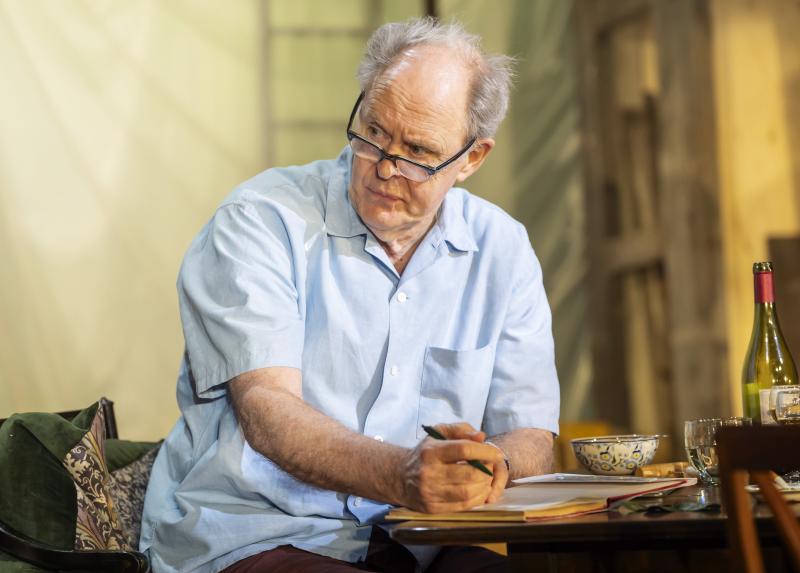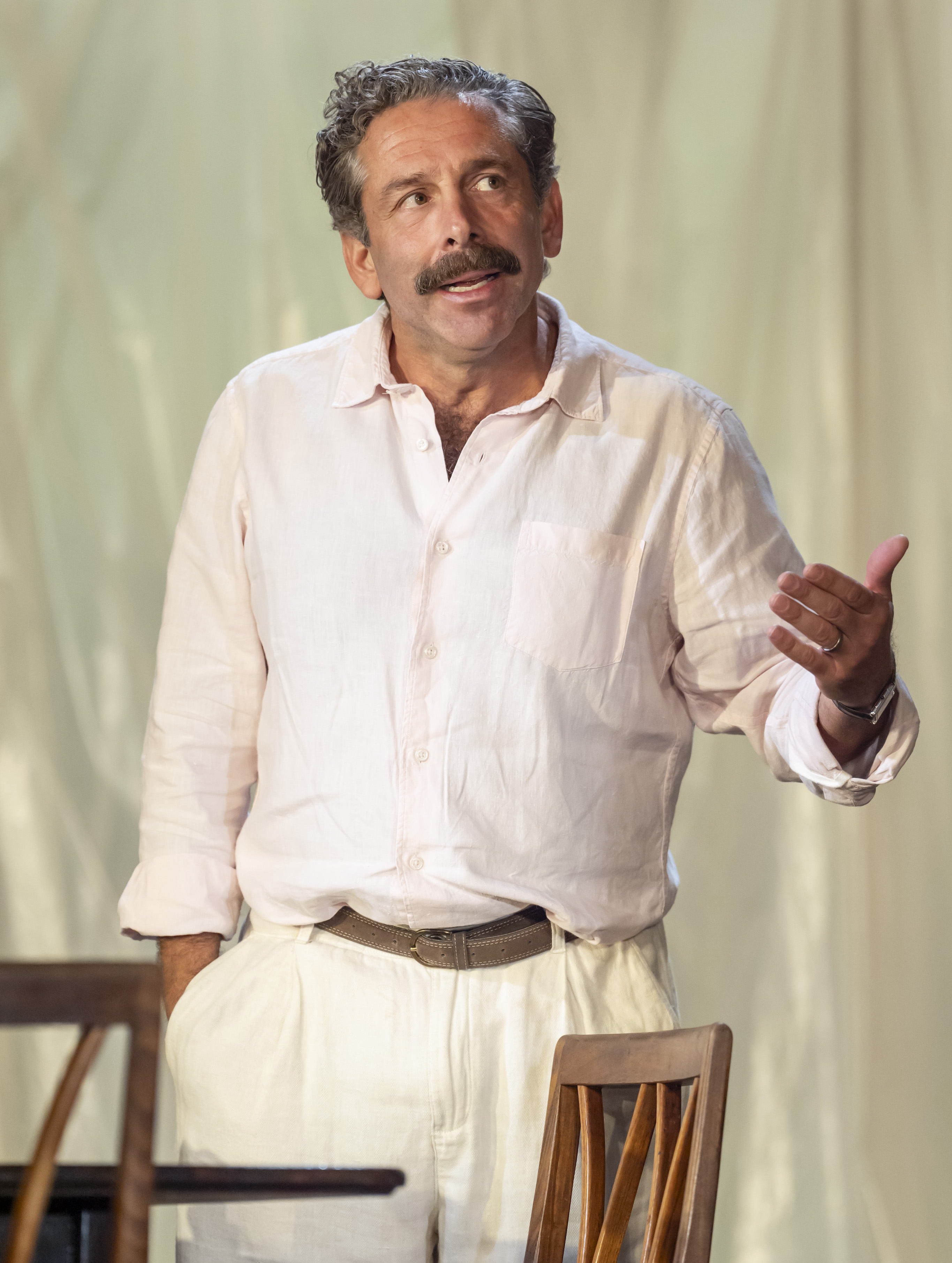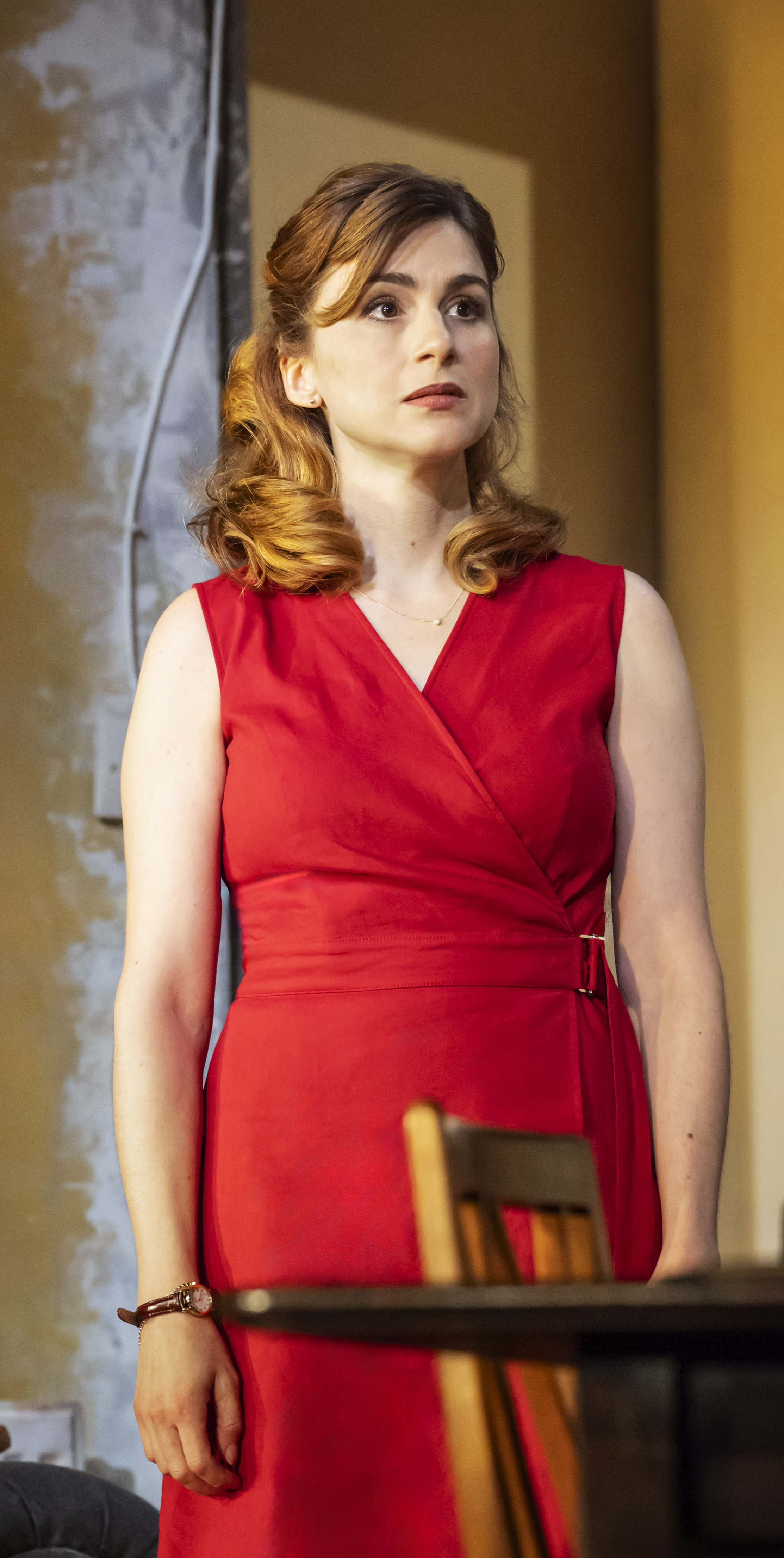Giant, Harold Pinter Theatre review - incendiary Roald Dahl drama with topical bite | reviews, news & interviews
Giant, Harold Pinter Theatre review - incendiary Roald Dahl drama with topical bite
Giant, Harold Pinter Theatre review - incendiary Roald Dahl drama with topical bite
John Lithgow gives a masterclass in delivering a 'human booby trap'

When Mark Rosenblatt was preparing his debut play, the miseries of the assault on Gaza were still over the horizon. Now they are here, another terrible moment in human history that resonates all through Giant. Since the play opened at the Royal Court last year, that ugly hum has grown even louder. Now transferred to the West End, it could have been written to give dramatic form to this most incendiary of talking points.
“Incendiary” is a word that we see author Roald Dahl gleefully welcoming as a compliment when applied to his writing. Indeed, what he seems to achieve in the course of the play seems to be a thorough and deliberate burning of his bridges. The shadow on his personal reputation remains, yet the work still flies high. Giant has set out to explore the issues for itself, by creating a fictitious encounter between the British and American publishers of Dahl’s children’s books at his country home. Only Dahl’s anti-semitic utterances are real.
The year is 1983, and the writer is renovating his home; or rather, his long-standing mistress, set designer Felicity “Liccy” Crosland (Rachael Stirling), is giving it a serious makeover. “Pat” – Dahl’s first wife, the actress Patricia Neal – has collected her last belongings and ceded the ground to the other woman. He is looking forward to a “new life”. But he has just reviewed a book for the Literary Review about the Israeli army’s invasion of Lebanon, God Cried, in which he is excoriating about the IDF, and Israelis in general, and his publishing minders fear the fallout on sales of his imminent book, The Witches. Already, New York state booksellers are refusing to stock it.
As the awards ceremonies have already indicated, the waspish, unrepentant writer is a whale of a role for John Lithgow, an uncanny Dahl lookalike, and also a soundalike. Onstage almost all the time, he powers the piece with his carefully barbed retorts, his mischief (and malice) lashing out effortlessly at his victims with faultless clipped diction and impeccable comic timing. He’s like a cobra, swaying gently before going in for the kill. A masterclass of a performance.
 Mind you, everybody here has the ability to land a line for maximum comic effect. One of the oddities of the play is that, with its drawing-room set, it looks and sounds a lot like an especially dark Ayckbourn number, though one with a fierce forensic intellect at its heart. Even the Australian cook (Tessa Bonham-Jones) gets laughs. Stirling's Liccy is a robust opponent who doesn’t allow Dahl all the liberties he wants, and regularly scores points off him. His UK publisher, Tom Maschler (Elliot Levey, pictured right), on the other hand, is an urbane wit with a comic passion for playing tennis and an ability to deliver a punchline with throwaway brilliance. When Dahl quizzes him relentlessly about his Judaism and wants to know where in London “you chaps” live nowadays, his perfectly timed reply brings the house down.
Mind you, everybody here has the ability to land a line for maximum comic effect. One of the oddities of the play is that, with its drawing-room set, it looks and sounds a lot like an especially dark Ayckbourn number, though one with a fierce forensic intellect at its heart. Even the Australian cook (Tessa Bonham-Jones) gets laughs. Stirling's Liccy is a robust opponent who doesn’t allow Dahl all the liberties he wants, and regularly scores points off him. His UK publisher, Tom Maschler (Elliot Levey, pictured right), on the other hand, is an urbane wit with a comic passion for playing tennis and an ability to deliver a punchline with throwaway brilliance. When Dahl quizzes him relentlessly about his Judaism and wants to know where in London “you chaps” live nowadays, his perfectly timed reply brings the house down.
The humour leavens what could have been a weighty debate, which moves along the same lines as current arguments about what sentient humans should think about the IDF vs Hamas. Most of the arguments in defence of Israel are articulated, sparkily, by a made-up character, Jessica Stone (Aya Cash, pictured below), the Jewish American sales manager of Dahl’s US publisher, who has arrived to make him feel wanted so he doesn’t flounce off to another company, as he has done before.
Cash, a Broadway import, is a vital addition to the cast, bringing a sharp, East Coast authenticity to this role. At first suitably polite and deferential, Dahl’s goading produces the protective she-wolf in her, and she ends the first act howling at him to apologise to her and all the other Jews she argues he has insulted in his blanket condemnation of the IDF's massacre of children in Lebanon.
 Rosenblatt has another weapon to add to humour: he shows Dahl being a perceptive, kindly man when children’s suffering is being discussed. The death of one of his children and the terrible maiming of another by an NYC cab reduces him to tears. He also makes Dahl sensitively zero in on Jessica’s family, having noted that she said she still reads Dahl books to her 15-year-old son, a sign that all is not well with the boy.
Rosenblatt has another weapon to add to humour: he shows Dahl being a perceptive, kindly man when children’s suffering is being discussed. The death of one of his children and the terrible maiming of another by an NYC cab reduces him to tears. He also makes Dahl sensitively zero in on Jessica’s family, having noted that she said she still reads Dahl books to her 15-year-old son, a sign that all is not well with the boy.
One of the giants hinted at in the title appears, Dahl’s gardener Wally (Richard Hope), model for The BFG, in almost too blink-and-you’ll-miss-it fashion near the end of the play. But it motors on teasingly to a climax, just when it seems to have peaked, via a phonecall in which some of Dahl’s actual comments to a journalist are reproduced as reported. The sentence where he cites Hitler causes a palpable intake of breath in the now-hushed audience.
It’s a neat conclusion to the unrolling of the debate, leaving us to ponder all sides of the issue. We have to decide first how to view Dahl himself. Is he predominantly a bitter, kvetching antisemite, angry at being the text to a “Quentin Blake picture look”, and at being ignored by the honours system because he’s not a literary novelist: at base is he no better than a belligerent, destructive child? Or should we forgive him as a man whose heart breaks at the suffering of children, his books designed to be a comfort to them while trying to open their minds? Despite being “a human booby trap” (Maschler), he is as kind to Jessica as he is vicious, a born entertainer of the young and young at heart.
Then there’s the issue of how Jews should react to Israel’s behaviour, an argument that feels weighted here against Dahl’s stance, by virtue of his blatant antisemitic opinions having literally almost the final say. Rosenblatt has no easy resolution to offer, why would he? Even so, he has created a drama the West End has too few of, one with a measured intelligence. It’s a play – and a production, ably directed by Nicholas Hytner – worthy of its awards, especially those for Lithgow.
- Giant is at the Harold Pinter Theatre until 2 August
- More theatre reviews on theartsdesk
rating
Explore topics
Share this article
The future of Arts Journalism
You can stop theartsdesk.com closing!
We urgently need financing to survive. Our fundraising drive has thus far raised £49,000 but we need to reach £100,000 or we will be forced to close. Please contribute here: https://gofund.me/c3f6033d
And if you can forward this information to anyone who might assist, we’d be grateful.

Subscribe to theartsdesk.com
Thank you for continuing to read our work on theartsdesk.com. For unlimited access to every article in its entirety, including our archive of more than 15,000 pieces, we're asking for £5 per month or £40 per year. We feel it's a very good deal, and hope you do too.
To take a subscription now simply click here.
And if you're looking for that extra gift for a friend or family member, why not treat them to a theartsdesk.com gift subscription?
more Theatre
 Deaf Republic, Royal Court review - beautiful images, shame about the words
Staging of Ukrainian-American Ilya Kaminsky’s anti-war poems is too meta-theatrical
Deaf Republic, Royal Court review - beautiful images, shame about the words
Staging of Ukrainian-American Ilya Kaminsky’s anti-war poems is too meta-theatrical
 Laura Benanti: Nobody Cares, Underbelly Boulevard Soho review - Tony winner makes charming, cheeky London debut
Broadway's acclaimed Cinderella, Louise, and Amalia reaches Soho for a welcome one-night stand
Laura Benanti: Nobody Cares, Underbelly Boulevard Soho review - Tony winner makes charming, cheeky London debut
Broadway's acclaimed Cinderella, Louise, and Amalia reaches Soho for a welcome one-night stand
 The Pitchfork Disney, King's Head Theatre review - blazing with dark energy
Thrilling revival of Philip Ridley’s cult classic confirms its legendary status
The Pitchfork Disney, King's Head Theatre review - blazing with dark energy
Thrilling revival of Philip Ridley’s cult classic confirms its legendary status
 Born with Teeth, Wyndham's Theatre review - electric sparring match between Shakespeare and Marlowe
Rival Elizabethan playwrights in an up-to-the-minute encounter
Born with Teeth, Wyndham's Theatre review - electric sparring match between Shakespeare and Marlowe
Rival Elizabethan playwrights in an up-to-the-minute encounter
 Interview, Riverside Studios review - old media vs new in sparky scrap between generations
Robert Sean Leonard and Paten Hughes make worthy sparring partners
Interview, Riverside Studios review - old media vs new in sparky scrap between generations
Robert Sean Leonard and Paten Hughes make worthy sparring partners
 Fat Ham, RSC, Stratford review - it's Hamlet Jim, but not as we know it
An entertaining, positive and contemporary blast!
Fat Ham, RSC, Stratford review - it's Hamlet Jim, but not as we know it
An entertaining, positive and contemporary blast!
 Juniper Blood, Donmar Warehouse review - where ideas and ideals rule the roost
Mike Bartlett’s new state-of-the-agricultural-nation play is beautifully performed
Juniper Blood, Donmar Warehouse review - where ideas and ideals rule the roost
Mike Bartlett’s new state-of-the-agricultural-nation play is beautifully performed
 The Gathered Leaves, Park Theatre review - dated script lifted by nuanced characterisation
The actors skilfully evoke the claustrophobia of family members trying to fake togetherness
The Gathered Leaves, Park Theatre review - dated script lifted by nuanced characterisation
The actors skilfully evoke the claustrophobia of family members trying to fake togetherness
 As You Like It: A Radical Retelling, Edinburgh International Festival 2025 review - breathtakingly audacious, deeply shocking
A cunning ruse leaves audiences facing their own privilege and complicity in Cliff Cardinal's bold theatrical creation
As You Like It: A Radical Retelling, Edinburgh International Festival 2025 review - breathtakingly audacious, deeply shocking
A cunning ruse leaves audiences facing their own privilege and complicity in Cliff Cardinal's bold theatrical creation
 Edinburgh Fringe 2025 reviews: Refuse / Terry's / Sugar
A Ukrainian bin man, an unseen used car dealer and every daddy's dream twink in three contrasting Fringe shows
Edinburgh Fringe 2025 reviews: Refuse / Terry's / Sugar
A Ukrainian bin man, an unseen used car dealer and every daddy's dream twink in three contrasting Fringe shows
 Faustus in Africa!, Edinburgh International Festival 2025 review - deeply flawed
Bringing the Faust legend to comment on colonialism produces bewildering results
Faustus in Africa!, Edinburgh International Festival 2025 review - deeply flawed
Bringing the Faust legend to comment on colonialism produces bewildering results
 Edinburgh Fringe 2025 reviews: Imprints / Courier
A slippery show about memory and a rug-pulling Deliveroo comedy in the latest from the Edinburgh Fringe
Edinburgh Fringe 2025 reviews: Imprints / Courier
A slippery show about memory and a rug-pulling Deliveroo comedy in the latest from the Edinburgh Fringe

Add comment